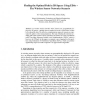331 search results - page 36 / 67 » Robot trajectory optimization using approximate inference |
136
Voted
JCB
2007
15 years 2 months ago
2007
Reconstructing phylogenetic trees efficiently and accurately from distance estimates is an ongoing challenge in computational biology from both practical and theoretical consider...
122
Voted
ATAL
2004
Springer
15 years 8 months ago
2004
Springer
Partially observable decentralized decision making in robot teams is fundamentally different from decision making in fully observable problems. Team members cannot simply apply si...
162
Voted
ML
1998
ACM
15 years 2 months ago
1998
ACM
To operate successfully in indoor environments, mobile robots must be able to localize themselves. Most current localization algorithms lack flexibility, autonomy, and often optim...
114
Voted
IROS
2007
IEEE
15 years 9 months ago
2007
IEEE
— This paper describes an approach to cooperative localization which finds its roots in robust estimation, employing an unknown-but-bounded error model for sensor measurements. ...
114
Voted
ICANNGA
2007
Springer
15 years 9 months ago
2007
Springer
Abstract. In wireless sensor networks where sensors are geographically deployed in 3D spaces, a mobile robot is required to travel to each sensor in order to download the data. The...

